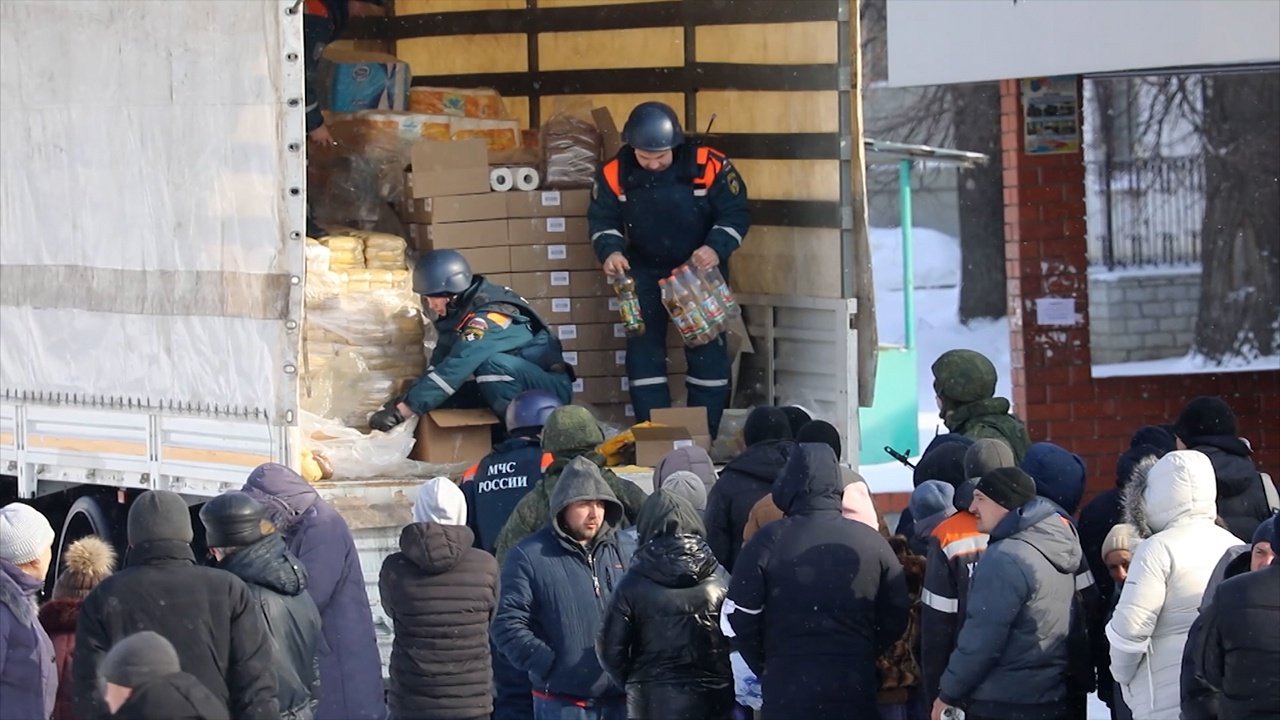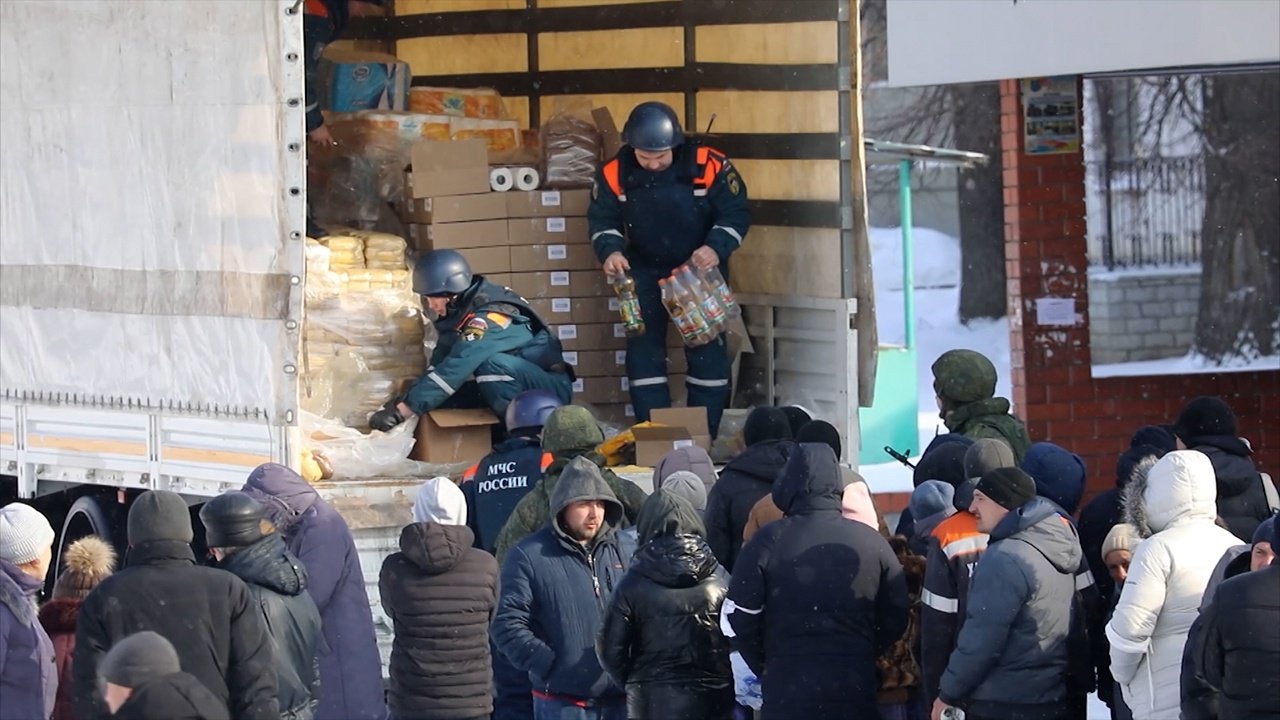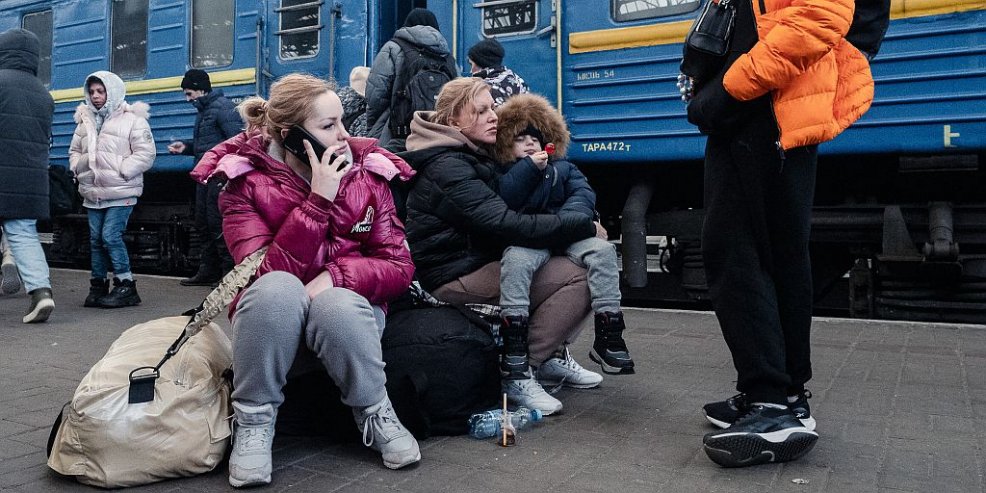Chinese State-Controlled company Nuctech is the biggest threat to the global Security Screening market as Huawei is a threat in 5G market. This present threat to the Global Market can be understood by an analogy that an enemy Terrorist is kept as a guard to your strategic assets because the Terrorist offered his services at cheap prices.
Chinese state-controlled company Nuctech, which provides screening systems for cargo, luggage, and passengers at airports and other ports of entry, has made significant inroads into the Global market in recent years.

U.S. Experts fear that systems that screen cargo and baggage could give companies such as Nuctech easy access to sensitive personal data and commercial information, and U.S. officials are concerned that Nuctech could turn over such data to the Chinese regime.
The State Department in a memo on May 8 stated that the Chinese vendor was bidding for contracts in more than a dozen European countries. For example, Finland, a North Atlantic Treaty Organization (NATO) member, that awarded a contract to Nuctech, dismissing U.S. lobbying efforts.
Nuctech was founded in 1997 by Hu Haifeng, the son of former Chinese Communist Party leader Hu Jintao. Last year, the majority of Nuctech’s parent company was transferred to the China National Nuclear Corp., which manages China’s nuclear weapons and power production.
According to its website, the company has “become an internationally famous brand in the security and inspection industry,” with a presence in 160 countries and regions in the world, including Iran, Syria, and Venezuela.
As per a report, Nuctech’s machines have been deployed widely in European ports of entry, raising concern that a Chinese state-controlled company has insights into all airports and ports across Europe. In the past six years, the Chinese firm has won 58 contracts with border control and customs authorities and other government organizations in 22 of the 28 EU member countries.
The company also managed to build its reputation through lucrative contracts, such as the 2008 Olympic Games in Beijing, the 2016 Olympic Games in Brazil, the 2015 Milan Expo, and the 2015 Wimbledon Open tennis tournament.
The global security screening market was valued at nearly $7 billion in 2019.
The State Department estimates that Nuctech is a dominant player in Europe’s sea-cargo screening equipment market, with a 90 percent share and holds up to 50 percent market share for Europe’s airport passenger baggage and cargo screening.
Related Article : PRC State-Owned Company And Others Charged With Economic Espionage in US
The company’s business practices, however, have come under increased scrutiny.
The U.S. Transportation Security Administration (TSA) barred the Chinese company from most of the American airport market in 2014. The company was later accused of retaining lobbyists in Washington to influence the TSA, and was also linked to corruption charges in several countries.
Chinese State-Controlled Company Nuctech participates in multiple trade fares, security exhibitions and conferences in different countries. This gives the company a chance to meet the key persons responsible for the procurement of security screening systems. This includes senior politicians and leaders in the governments in respective countries and the key personnels from different government bodies such as Customs, Airport authorities and key government security installations. This gives a chance to the Chinese State-Controlled Company Nuctech to prepare a list of who’s who and whom to approach.
Nuctech has grown significantly because of its ability to underbid its competitors in many countries.
Axel Voss, a European Parliament member from Germany, raised concerns about the company in December, accusing it of “using a massive low-level pricing strategy” to win contracts.
In the past decade, through large government subsidies, China has managed to create its own national conglomerates in key industries. And recently, these subsidies have been widely used to achieve dominance in high-technology sectors, as outlined in the “Made in China 2025″ blueprint.
Chinese State-Controlled Company Nuctech, as all other Chinese companies do, denied accusations that it received state subsidy or government instructions.
Related Article : Chinese Industrial Espionage Cases In The USA: The Modus Operandi
Charges of Bribery against Nuctech
As per an article published in 2009, A Namibian court on 11-August-2009 granted bail to two Namibians and a Chinese national Yang Fan who was representative of Nuctech, suspected in a corruption probe involving Nuctech, linked to the son of China’s President Hu Jintao.
“All three suspects are granted bail, and once paid are to be released,” said Magistrate Gerhard van Pletzen on the second day of the trio’s bail hearing in the capital Windhoek.
The three were arrested in July 2009 in Namibia as part of the probe into bribery allegations involving Nuctech, a company headed by China’s President Hu Jintao’s 38-year-old son, Hu Haifeng.
Nuctech representative Yang Fan was granted bail of 250,000 Namibian dollars (US$31,652), while Namibian nationals Teckla Lameck and Jerobeam Mokaxwa each got bail of 50,000 Namibian dollars.
Van Pletzen ordered the three to hand in their passports and to report to the police twice a day. They are not allowed to leave Namibia, but may travel within the country.
Public prosecutor Andrew Muvirimi on Monday opposed bail, arguing that the trio “may abscond from Namibia to other countries”.
‘We fear they may interfere with investigations’
“Investigations are still at an initial stage and we fear that Lameck and Yang may interfere with police investigations if out on bail,” Muvirimi added.
Nuctech won a contract to supply the Namibian government with security scanning equipment in a US$55.3 Million deal, paid for with a Chinese loan granted when President Hu Jintao visited Namibia in 2007.
Their arrest came after the southern African state’s Anti-Corruption Commission alleged that a US $12.8 Million down payment on 13 scanners had been diverted to a firm called Teko Trading, equally owned by Lameck and Mokaxwa.
All three accused later drew large sums from the Teko account, with Yang taking 16.8 Million Namibian dollars, most of which he paid into an investment fund, investigators said.
Hu Jintao’s son was president of Nuctech until last year i.e. 2008, when he was promoted to Communist Party secretary of Tsinghua Holdings, which controled Nuctech and more than 20 other companies by the year 2009. Hu Jintao retired in 2012 and was succeeded as China’s paramount leader by Xi Jinping.
Related Article : The Threat Posed By The Chinese Government And The Chinese Communist Party To The Economic And National Security : Christopher Wray, Director FBI
NucTech’s Philippines Scandal – Not only the X-ray machines were expensive, repairs was also Expensive. Above all, the machines Could not detect a single drug smuggling in 10 years nor could detect arms being smuggled.
The Commission on Audit (COA) asked the Bureau of Customs to review the contract and loan agreement for mobile X-ray machines purchased in 2006 after it was found to be ”exorbitantly overpriced” by Philippine peso 4.215 billion.
The Philippine government paid Philippine peso 7.953 billion to Chinese firm Nuctech Co. Ltd. for 30 units of mobile X-ray equipment, through a loan agreement with the Chinese government.
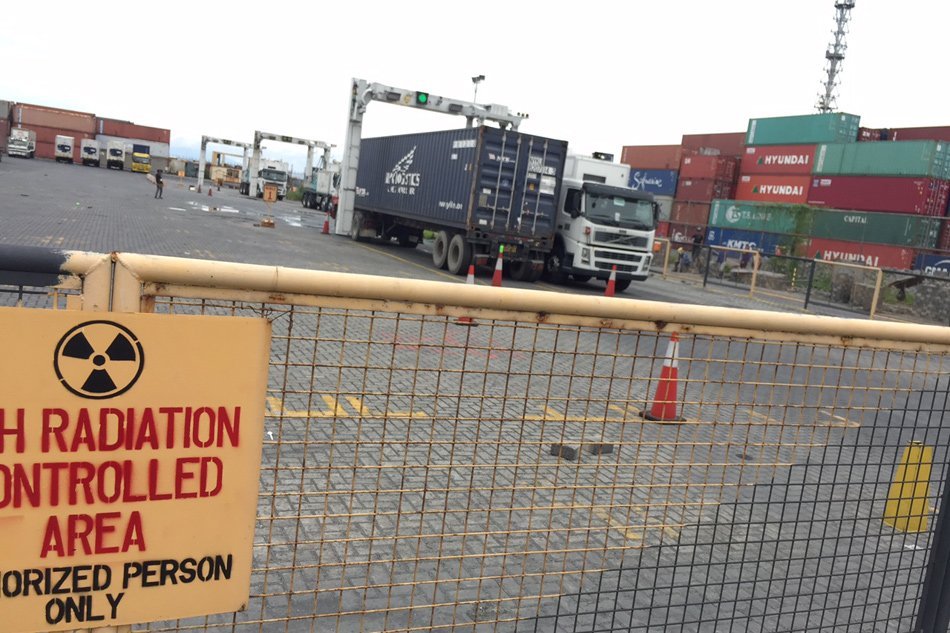
But when COA asked for a quotation from another international supplier of non-intrusive container inspection scanners, it found that the government could have bought the X-ray machines for a cheaper price and an even better performance.
COA’s quotation from the said supplier showed that an X-ray machine “with vastly superior performance” only costs Philippine peso 124.6 million each, for a total of Philippine peso 3.738 billion for thirty units.
The cheaper machines are said to have “a product designed to be utilized at sea ports that can scan trucks and containers five times the speed of the mobile X-rays that BOC have,” COA’s special audit read.
COA added, the excessive expenditures on the machines “added to the (National Government) in terms of foreign loans contracted and future repayments.”
Costly Repairs, Maintenance
Aside from overpriced units, COA also found that the maintenance cost of the X-ray machines from Nuctech was also more expensive by P3.264 million compared to other suppliers.
Based on the records, Nuctech charged the government P1.119 billion for the repair and maintenance of 29 X-ray machine units from January 2009 to June 2015, averaging to P9.564 million per year while other international service providers only charge P6.3 million.
“Nuctech’s maintenance cost is P3,264,628.17 or 1.51 times higher than the other international service provider/supplier,” COA said.
“This annual difference in the cost of repairs and maintenance for each X-ray machine could have been saved and used to pay the loan incurred by the [National Government].”
COA also noted that the BOC failed to submit evaluation reports on the performance of Nuctech since the procurement of the scanners, which could have addressed deficiencies.
COA said the BOC should evaluate the purchase contracts with Nuctech, as well as the supply contract and loan agreement with China for possible reduction in the amount of the loaned, and price paid for the X-ray machines. The auditing body also asked BOC to bid out the contract for maintenance services.
Faeldon said the purchase was made under a Government-to-Government Agreement between the Philippines and China, which means a repricing would need a re-negotiation between the two countries.
Could not detect a single drug smuggling in 10 years
The BOC has also refused to pay the annual maintenance fee until Nuctech can prove that the mobile X-ray machines has the capability to detect illegal items, such as prohibited drugs.
“The very alarming data is, in the past 10 years since 2006 to today, it has zero detection of…shabu and other drugs,” Faeldon said.
“I cannot just arbitrarily recommend. I really need to evaluate. Kasi sa akin, kung wala talagang capability ito, it’s not just P4 billion over pricing. How can I protect the border if our X-ray machines are inutil?”
Nuctech used Honey Trap in Taiwan
As per another report , The Taoyuan District Court on 26-February 2020, found Sun Yi-ming (孫一鳴), former head of the Aviation Police Bureau’s aviation security section, guilty of corruption.
Sun, who was arrested in 2016, was sentenced to 17 years and six months in prison for receiving kickbacks and engaging in other illicit activities relating to a NT$70 million (US$2.31 million at the current exchange rate) contract to procure X-ray scanners, which were supplied by Chinese company Nuctech.
The main contractor in the case, Han Yuan Co owner Tsai Yi-jen (蔡依仁), was also found guilty of colluding with Sun and received a five-year and eight-month sentence.
An investigation found that Nuctech had sent a 30-something female sales manager, Li Weilin (李委霖), to lure Sun into a honey-trap and obtain information about the procurement project.
An investigation found that Nuctech had sent a 30-something female sales manager, Li Weilin (李委霖), to lure Sun into a honey-trap and obtain information about the procurement project.
Experts said the case reeked of a Chinese intelligence operation, with an eye to penetrating Taiwan’s airport and border security, as Nuctech is known to be one of China’s “princeling companies” with strong political and business connections in Beijing.
Media reports have said that Hu Haifong (胡海峰), son of former Chinese president Hu Jintao (胡錦濤), was a former chairman of Nuctech, and that the company enjoys a close relationship with the Chinese military establishment and government agencies.
It is reportedly one of the few manufacturers of X-ray machines to obtain approval and certification by China’s civil aviation authority for installation at airports.
When prosecutors launched an investigation into case, questions were raised that the X-ray scanners might have embedded programs that send data and scanned images to China, threatening national security.
When prosecutors launched an investigation into case, questions were raised that the X-ray scanners might have embedded programs that send data and scanned images to China, threatening national security.
Local media reports said that at least four Nuctech X-ray scanners installed in 2014 were still being used at Taiwan Taoyuan International Airport, and several more are in other airports in the nation.
After their initial installation, airport security officials took to calling them “blind X-ray scanners,” because they compared poorly in terms of standard and performance with international brands, were prone to breakdowns and frequently unable to detect restricted items, media reports said.
After their initial installation, airport security officials took to calling them “blind X-ray scanners,” because they compared poorly in terms of standard and performance with international brands, were prone to breakdowns and frequently unable to detect restricted items, media reports said.
Reports said that the US Department of Homeland Security had officially informed Taiwan that goods checked by the Nuctech scanners would not be allowed on flights to the US.
The investigation found that Sun received NT$3.06 million from Nuctech to approve the procurement, and that despite being married, he met frequently with Li for sex since 2013.
Li accompanied Sun on holiday trips to Singapore, the UK and various Chinese cities over the years, and a search of Sun’s residence found USB memory sticks containing sex tapes they had made during their travels, investigators said.
Sun colluded with Nuctech by working to have parts shipped for assembly and repackaging in Japan to deceive Taiwanese regulators, who were led to believe the scanners were made in Japan, bypassing a ban on Chinese-made products in procurement’s of high-tech machines used for national security, investigators said.
Other Countries
In 2018, Chinese State-Controlled Company Nuctech provided full body scanners, similar to what passengers go thru at airport security, to a jail in Dane County, Wisconsin, U.S.
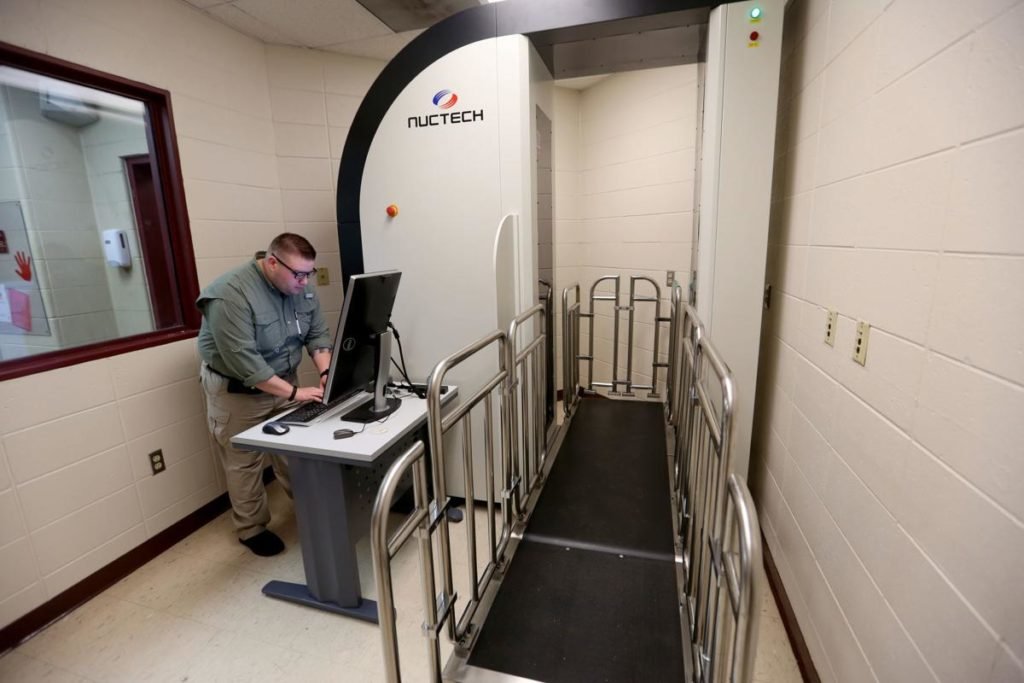
In 2018, Chinese State-Controlled Company Nuctech hired Brian E. Finch of Pillsbury Winthrop Shaw Pittman LLP as its lobbyist.
Chinese State-Controlled Company Nuctech wins $6.8M contract to supply security equipment to Canada’s embassies
The government of Canada has awarded an estimated $6.8 million contract to a state-owned Chinese company to supply security equipment for 170 embassies, consulates and high commissions around the globe.
The contract for conveyor-style X-ray machines was awarded to Beijing-based Nuctech Company.
Nuctech is known as the “Huawei of airport security,” supplying X-ray machines, scanners and explosive detection systems to airports and customs offices in 160 countries. The company sees a bright future for its airport body scanners, which feature a thermal imaging camera that can detect elevated body temperatures.
Global Affairs Canada has been upgrading embassy security and, through the department of Public Services and Procurement Canada, issued tenders for walk-through metal detectors, X-ray machines, and bullet resistant windows and doors.
Security companies were invited last December 2019 to submit bids, separately or jointly, for the metal detectors and X-ray machines. The tender document said the contract would be awarded to the lowest-bidder.
California-based Rapiscan Systems won the contract for the metal detectors but was undercut by Nuctech for the X-ray contract.
The winning bids were posted on the government’s Buy and Sell website on Thursday, 16-July 2020.
A security industry source said that the X-ray machines are stand-alone systems that would not be connected to embassy networks. But he said he is concerned that there will now be “significant pieces of Chinese technology sitting in every embassy”. The contract includes delivery, installation, operator training and software.
Nuctech has been accused in the past of engaging in controversial business practices in Asia, Africa and Europe, including offering soft loans and illegal dumping.
Critics of state-owned enterprises allege the Chinese government subsidizes its companies to allow them to bid at lower prices than Western competitors.
They point out that no Canadian company would be allowed to install security equipment in any Chinese embassy.
Guy Saint-Jacques, a former Canadian ambassador in Beijing, said reciprocity is important when dealing with China.
He said he hopes Ottawa re-examines a bidding process that awards contracts on price alone because it “creates vulnerabilities.”
“The problem of competing with state-owned companies is very difficult,” he said.
There are long-term implications for Western economies
The former ambassador said he recalls a conversation with an ex-CEO of Bombardier, who said he could compete with Chinese companies in China but not in Boston or Chicago, where they would submit subsidized bids up to 40 per cent lower than Western companies.
The Chinese strategy overseas is to win market share and, once dominant, dictate prices, Saint-Jacques said. “There are long-term implications for Western economies,” he said.
Canadian minister promises review after security contracts awarded to Chinese-state tech company
Canada’s minister of foreign affairs has promised to review Ottawa’s purchasing of security equipment as details emerge of five contracts awarded to a controversial high-tech company that is connected to the highest levels of the Chinese Communist Party.
This week Ottawa posted details of the latest winning bid for Beijing-based Nuctech, in a deal to install X-ray scanning equipment and software to provide security for 170 Canadian embassies, consulates and high commissions worldwide.
Nuctech was founded in 1997 by the son of former Chinese president Hu Jintao, and the security company has rapidly accumulated contracts worldwide for sensitive airport and border security infrastructure, while attracting criticism for alleged unfair business practices and allegations of corruption in Africa.
Already, since 2017, Nuctech has been awarded four border security and customs warehouse contracts valued at $6.5 million, to provide scanners and lab equipment to Canada Border Services Agency (CBSA), according to procurement documents.
This is despite mounting concerns among some national security experts about Nuctech’s growing access to sensitive facilities worldwide.
A statement from Minister of Foreign Affairs Francois-Phillipe Champagne promised to review “any possible issue relative to security or safety … all appropriate actions (will be) taken to ensure the safety of our missions around the world.”
“We are currently looking into the offer with Nuctech Company to provide some security screening equipment in our missions abroad,” Champagne’s statement said. “Global Affairs has not purchased any equipment from Nuctech at this time.”
“In addition, I have today directed GAC officials to review our purchasing practices when it comes to security equipment and to continue reviewing the security of our missions around the world.”
A spokeswoman for CBSA said the agency could not immediately respond Friday, but is looking into whether its four deals for Nuctech security equipment could raise security concerns.
Security Concerns Raised by Experts
Meanwhile, in Europe, some analysts are complaining that Nuctech is making rapid inroads providing services to border security facilities due to China’s state-backing, unfair practices, and potentially Beijing’s influence over some European politicians.
“Nuctech provides the services, systems and software to support its equipment, which can be connected to databases containing the personal data of millions of Europeans managed by airports,” Politico reported in February.
The story quoted Axel Voss, a German federal politician, who said: “it’s extremely worrisome if a foreign state-funded company gets more and more control over our strategic infrastructure.”
Carleton University professor Stephanie Carvin, a former Canadian Security Intelligence Service official, said the Nuctech contract for Canadian embassies presents security concerns, but she believes China’s “geo-economic” strategy is the bigger concern.
“This is not Huawei. I’m not as concerned as I would be with telecommunications,” Carvin said. “The issue is the fact companies like Nuctech are inherently anti-competitive, they may in some cases be beneficiaries of stolen technologies, and they want to fundamentally take over and undermine western technologies.”
However, another Canadian security expert, who asked not to be identified due to risks related to China, said Nuctech presents a serious high-tech danger.
“All electronic equipment is an end-point and potential access point into your network and data,” the expert said. “For Global Affairs to proceed when China has been implicated in a systematic campaign of cyber-espionage against Canada, while former diplomats are being held hostage and tortured in Chinese prisons, is unintelligible.”
As per an expert, “Nuctech has already set precedents of Bribery, and selective functioning. As in the case of Philippine, the Scanners never identified drugs or arms in 10 years, it is highly possible that Chinese are selling them cheap because they need entry point at strategic locations from where they can smuggle illegal Narcotics and arms and ammunition as they would know all the loop holes in the scanners and which material the scanners cannot detect, or there could be a kill switch to prevent detection of certain kind of material by the scanners either by hardware or software during any of the software upgrades or maintenance activities. What if on a port, the large containers carrying illegal drugs or arms are not detected and are let to pass the customs believing that the scanner has already checked it. Knowing the infamous history of China, even if the Chinese give their scanners and security screening equipment Free of Cost, they are a big risk. Moreover in the modern times when internet of things is very common, what if all these security equipment may turn out to be Chinese spies like the Chinese mobile apps like TikTok and other Apps that share user data to Chinese Government?”
NucTech makes inroads in India
Nuctech India Pvt. Ltd. ( A Wholly Owned Subsidiary Of Nuctech Company Ltd.) is already operating in India and has made inroads into several strategic locations. After the recent Chinese belligerence and land grabbing act, all security equipment of Chinese Origin have become a security threat.

Related Article : Government Of India Bans 59 Chinese Mobile Apps including Tik Tok
As per some media reports, Nuctech India’s website says, its products are sold to various Airport Authority India-run airports, metro transits, state police, paramilitary, defence, High Courts, banks and other corporate clients. The website says it has a staff of over 60 employees and offices in Delhi, Mumbai, Chennai, Kolkata and Guwahati. “We have the intent and the reach to market and service our entire range of Security products and solutions,” it says. Its products include baggage scanners, cargo and vehicle scanners, personal screening equipment, explosive and narcotics detectors, and radioactive substance monitoring, among others.
However we could not find the information related to the customer base of Nuctech in India.
Some Screenshots from Nuctech India’s Website:-






Related Article : China Is The Biggest Drug Peddler In The World : Fentanyl Killed 100,000 People In US Alone In A Year – Report
Actions Planned
The European Union announced this month that it would adopt protectionist policies to defend its companies against subsidized foreign competitors, an attempt to curb activities of Chinese companies such as Nuctech.
After a period of public consultation, the EU will introduce a new legal instrument on foreign subsidies next year, according to European Commission Vice President Margrethe Vestager, who’s in charge of competition and digital policy.
The new policy would block investments and public-tender bidding by heavily subsidized foreign companies.
Points to Ponder
It is high time that every country makes an inventory of anything and everything that is made in China. Even if China gives all the security scanners and machines free of Cost, Chinese are always a security threat and can cost any country very expensive in overall cost. As an expert said, “What if the scanner does not detect certain kind of material or has a kill switch or turns a blind eyes to certain narcotics and arms?”.
Having anything related to security is akin to appointing an enemy to guard your strategic installations or a Robber to guard your gold. Which sane country would risk that on the basis that the equipment came cheap?
Follow us at:-
Twitter Handle: @newscomworld
Instagram Handle: @newscomworld
Parler Handle: @newscommuniquecom
Subscribe our : YouTube Channel https://www.youtube.com/channel/UCnKJQ3gFsRVWpvdjnntQoAA
Like our Facebook Page https://m.facebook.com/News-Communiquecom-103788531007438/
3,835 total views


